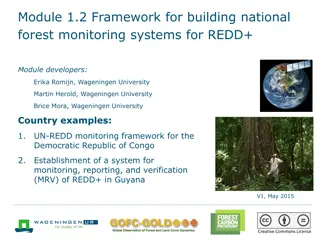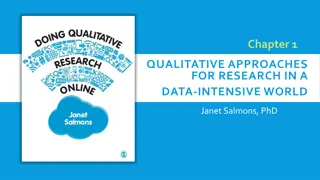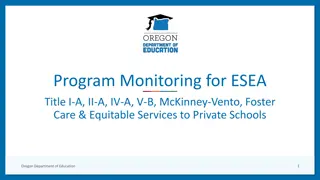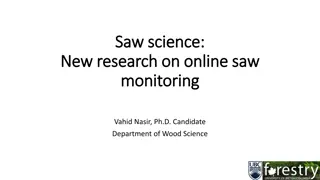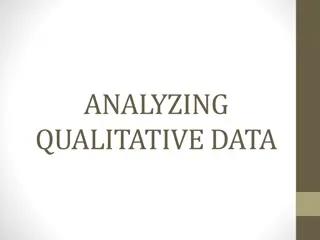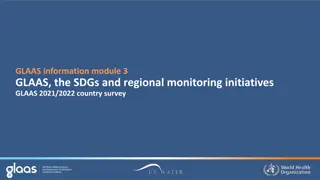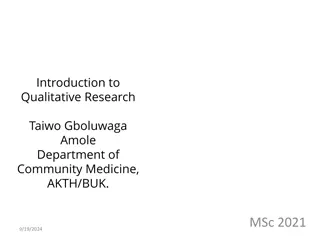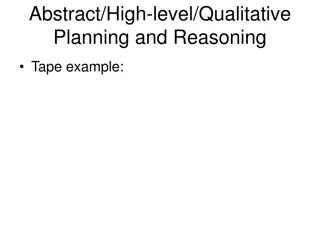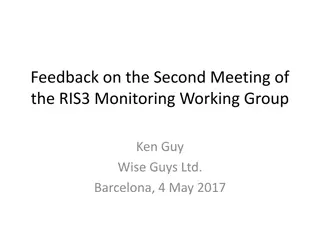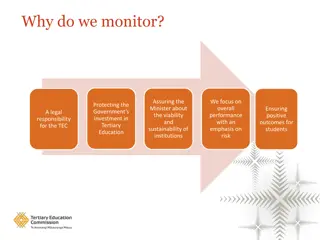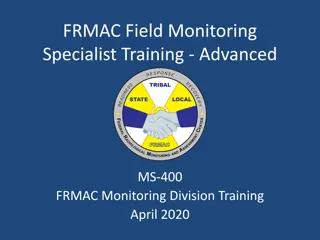Understanding Quantitative and Qualitative Research Methods
Exploring the differences between quantitative and qualitative research methods, this content delves into the importance of qualitative research, various methodologies such as focus groups and interviews, data collection, research ethics, and analysis techniques. It also covers the elements of the r
4 views • 43 slides
Understanding Qualitative Research: Foundations and Orientations
Explore the foundations of qualitative research and orientations to meaning in Big Q qualitative methods. Delve into the values, characteristics, and theoretical underpinnings of qualitative inquiry, and reflect on the significance of meaning-making in research. Consider the role of subjectivity in
0 views • 23 slides
Understanding the Case Study Method: In-depth Qualitative Analysis
The case study method is a popular form of qualitative analysis involving intensive observation of a social unit. It focuses on detailed analysis of a limited number of events or conditions to understand complex interrelationships. Characteristics include intensive study of a single unit, qualitativ
1 views • 8 slides
Enhancing Natural Experiment Research Through Qualitative Work
Qualitative research plays a crucial role in enhancing natural experiment studies by providing insights into the processes of exposure to interventions, identifying variables influencing exposure likelihood, and determining suitable control groups. Complementary methods within the RE-AIM framework a
0 views • 13 slides
NIMH Clinical Research Education and Monitoring Program Overview
NIMH's Clinical Monitoring and Clinical Research Education, Support, and Training Program (CREST) aims to ensure the proper conduct, recording, and reporting of clinical trials. This program includes clinical monitoring plans, guidelines for site monitoring activities, and independent clinical monit
1 views • 29 slides
Qualitative Data Analysis Techniques in Research
The purpose of data analysis is to organize, structure, and derive meaning from research data. Qualitative analysis involves insight, creativity, and hard work. Researchers play a crucial role as instruments for data analysis, exploring and reflecting on interview discussions. Steps include transcri
1 views • 27 slides
Using Qualitative Methods in Quality Improvement Projects
Qualitative methods offer valuable insights in quality improvement projects by capturing non-numerical information like experiences, thoughts, and perspectives. They help to understand patient and staff perspectives, challenges, and successes in QI initiatives. Utilizing techniques such as interview
1 views • 21 slides
Understanding Experiential vs. Critical Qualitative Research
Delve into the foundations of qualitative research with a focus on experiential and critical approaches. Explore key concepts, defining characteristics, and theoretical foundations, distinguishing between qualitative and quantitative research. Reflect on different orientations, subjectivity, and ref
0 views • 16 slides
Exploring Key Characteristics of Qualitative Research in Psychology
The lecture series delves into the values, characteristics, and theoretical foundations of qualitative research, emphasizing the differences from quantitative methods. It explores experiential and critical qualitative camps, subjectivity, reflexivity, and ontological and epistemological foundations.
4 views • 18 slides
Ensuring Trustworthiness in Qualitative Research Studies
Trustworthiness in qualitative research is essential for establishing confidence in the study outcomes. Guba's four criteria - credibility, transferability, dependability, and confirmability - provide a framework for achieving trustworthiness. Strategies such as adopting reliable research methods, u
3 views • 10 slides
Understanding NVivo: A Brief Introduction to Qualitative Data Analysis Software
Explore the world of NVivo with Dr. Will Fassbender, an Assistant Professor at Montana State University. Gain insights into qualitative data analysis, download procedures, basic functions, and more. Join this introductory session to discover how NVivo can streamline your research process and aid in
0 views • 16 slides
Contrasting Qualitative and Quantitative Traits in Genetics
Genetic traits in organisms can be qualitative or quantitative, with qualitative traits controlled by single genes and showing distinct variations, while quantitative traits are influenced by multiple genes and environmental factors, resulting in continuous variations. Qualitative genetics focuses o
0 views • 13 slides
Metamodel-based Photovoltaic Monitoring System for Renewable Energies at Hongik University
This project at Hongik University focuses on developing a metamodel-based photovoltaic monitoring system to address the challenges of managing diverse solar monitoring systems in Korea. By utilizing a unified data communication protocol, the system aims to streamline the monitoring process for solar
0 views • 18 slides
Qualitative Analysis of Aldehydes and Ketones in Chemistry Lab
In this Chemistry 318 lab, students will conduct qualitative analysis of aldehydes and ketones using chemical and spectroscopic methods. The lab includes classification tests, spectroscopy (IR, 1H-NMR/13C-NMR, MS), and identification of unknown compounds. Experimental procedures involve physical eva
1 views • 11 slides
Understanding Quantitative Genetics Principles in Animal Breeding
Quantitative genetics focuses on the inheritance of characteristics based on degree rather than kind, compared to qualitative genetics. It involves polygenes controlling quantitative traits, which exhibit continuous variation and can be measured using metric units. Qualitative traits, on the other h
0 views • 22 slides
Framework for Building National Forest Monitoring Systems for REDD+
This module outlines a comprehensive framework for developing national forest monitoring systems for REDD+ initiatives. It covers key components such as satellite land monitoring, national forest inventories, greenhouse gas reporting, emission factors, and integrated monitoring systems focusing on c
0 views • 14 slides
Understanding Qualitative Methodology: An Overview
This presentation delves into the realm of qualitative methodology, exploring its purpose, characteristics, approaches, data collection methods, analysis, and learning outcomes. It aims to provide a deep understanding of how qualitative research illuminates voices and experiences, distinguishes betw
0 views • 41 slides
Qualitative Approaches in a Data-Intensive World
Qualitative research involves studying perceptions, experiences, and behaviors through verbal or visual expressions. In a data-intensive world, online communication plays a crucial role in data collection. Qualitative eResearch utilizes Information and Communication Technologies (ICTs) strategically
0 views • 10 slides
Developing Monitoring Tools for Programmatic Oversight
This presentation covers key aspects of monitoring tools for program oversight, including types of monitoring documents, notice of monitoring, and elements to consider. It discusses the importance of informing subawardees about monitoring visits and outlines the components of monitoring forms used i
0 views • 64 slides
Unpredictable Arctic Monitoring Framework for Extreme Event Integration
This project focuses on integrating extreme event monitoring into existing biodiversity monitoring efforts in the Arctic. The task involves developing a monitoring framework, identifying types of extreme events, and monitoring variables aligned with biodiversity plans. The review paper discusses the
0 views • 15 slides
Meaning and Meaning-making in Big Q Qualitative Research
Qualitative research explores different understandings of meaning and meaning-making, providing researchers with tools, techniques, and values. Big Q qualitative research focuses on the active role of words in creating meaning beyond reflecting experiences. This lecture series delves into the founda
1 views • 20 slides
Effective Monitoring Practices for Federal Programs in Education
Effective monitoring practices for federal education programs, such as ESEA Title I-A, II-A, IV-A, V-B, McKinney-Vento, Foster Care, and Equitable Services to Private Schools by the Oregon Department of Education. The monitoring process involves desk monitoring and on-site visits to ensure education
0 views • 23 slides
Advancements in Online Saw Monitoring for Wood Industry 4.0
Explore the latest research on online saw monitoring in the context of Industry 4.0, focusing on tools like cloud computing, smart sensors, and artificial intelligence for enhanced monitoring capabilities in the sawmill industry. Discover the importance of tool health monitoring, wear detection, and
0 views • 22 slides
Importance of Field Monitoring in Adventure Activities
Field monitoring plays a vital role in ensuring the safety and effectiveness of adventure activities. It involves providing necessary information, instruction, training, and supervision to staff members, thus assuring management of real-time happenings and instilling confidence in both staff and man
0 views • 8 slides
Analyzing Qualitative Data: Steps and Coding Methods
Understanding qualitative data analysis involves several key steps, such as preparing the data through transcription, developing codes and categories using content analysis, revising categories based on the data, and reporting the analysis results. Content analysis helps in identifying words, themes
0 views • 32 slides
Design Philosophy for Increasing Accessibility in Qualitative Data Analysis Software
Growing interest in qualitative research methods has led to increased use of Qualitative Data Analysis Software (QDAS). However, challenges remain in making these tools accessible and easy to use, especially in educational settings. This article explores design philosophies to enhance accessibility
0 views • 16 slides
Analyzing U.S. Higher Education Success Metrics: A Qualitative Perspective
Delve into the nuances of U.S. higher education success metrics through a qualitative analysis, exploring the classification of qualitative successes in quantitative datasets and the factors influencing accurate or inaccurate classifications. The study involves individuals who attended community col
0 views • 18 slides
Perceived Risks and Risks Mitigation Practices in Informal Waste Workers: A Qualitative Study
A qualitative study conducted in Kathmandu Valley exploring the perceived risks and mitigation practices of informal waste workers. The research project, led by Sujata Sapkota, aims to address the occupational and health challenges faced by these workers. The study includes a mix of quantitative and
0 views • 22 slides
Strategies for Collective Qualitative Secondary Analysis Using Combined Datasets
Collective qualitative secondary analysis involves reusing data through a collaborative lens, embracing multiple viewpoints to gain deeper insights. The approach emphasizes the constructed nature of research data and allows for diverse interpretations and engagements. This article discusses the proc
0 views • 15 slides
Comprehensive Overview of GLAAS, SDG Monitoring, and Goal 6 Indicators
The content delves into the Global Analysis and Assessment of Sanitation and Drinking-Water (GLAAS), its relationship with the Sustainable Development Goals (SDGs), particularly Goal 6 on clean water and sanitation. It discusses regional monitoring initiatives, the 2030 Agenda for Sustainable Develo
0 views • 16 slides
Understanding Research Methods in Public Health
Exploring the nuances of qualitative and quantitative research methods in the context of public health, this content delves into how each approach offers unique insights and perspectives. It discusses the importance of qualitative research in uncovering underlying factors influencing health, interpr
0 views • 77 slides
Qualitative Approach in Cognitive Interview Data Analysis
Understanding the importance of a qualitative approach in analyzing cognitive interview data is crucial for uncovering patterns and recurring themes. This involves delving deeper into the why behind the responses rather than just naming and classifying data. Using methods like standardised coding sc
0 views • 18 slides
Creative Problem Solving through High-level Qualitative Planning and Reasoning
Explore the world of abstract and high-level qualitative planning through examples like MacGyver's inventive solutions, opening jar tricks, and audience participation in problem-solving. Witness how qualitative reasoning can lead to innovative solutions in various scenarios.
0 views • 15 slides
Understanding Qualitative Data in Counseling
Exploring the challenges and strategies in utilizing qualitative data in counseling, this discussion covers topics such as data collection, coding for meaning, and presenting qualitative evidence. The importance of qualitative data in improving counseling programs and student services is highlighted
0 views • 32 slides
Insights from RIS3 Monitoring Working Group Meeting at Ken Guy Wise Guys Ltd.
The feedback from the second meeting of the RIS3 Monitoring Working Group at Ken Guy Wise Guys Ltd. in Barcelona highlighted key tasks, including presentations on monitoring exercises, participatory exercises, and the RIS3 Monitoring Clinic. The presentation emphasized humor in communication, while
0 views • 5 slides
Effective Monitoring and Investment Relationship in Tertiary Education Institutions
Assurance of viability and sustainability of institutions, focusing on overall performance and risk assessment, safeguarding government investments in tertiary education, ensuring positive student outcomes, and fulfilling legal responsibilities for the Tertiary Education Commission. Monitoring activ
0 views • 6 slides
Advanced Field Monitoring Specialist Training for FRMAC - MS-400
Providing a refresher for FRMAC Field Monitoring Specialists, this advanced MS-400 training emphasizes sampling and monitoring equipment, data collection methods, and operations. The course includes updates in Monitoring Division operations, lessons learned from past experiences, refresher topics fr
0 views • 12 slides
Foundations of Qualitative Research: Understanding Methods and Data
Qualitative research involves a mix of different methods drawing on qualitative data, with debates on the need for a sensitive approach for richer appreciation. Understanding qualitative data and context, along with various types of data such as interviews and user-generated content, is essential fo
0 views • 41 slides
Side Channel Monitoring in Additive Manufacturing for Cybersecurity and Quality Assurance
Side channel monitoring is crucial in the field of additive manufacturing to bridge cybersecurity and quality assurance. This process involves detecting physical domain data leakage through various side channels like acoustics, thermal, laser, vibration, electric current, optical, and pressure. By m
0 views • 10 slides
Overview of Title I, Part D Monitoring in Education
This presentation covers the importance of monitoring Title I, Part D programs in education to ensure compliance with State and Federal laws. It includes information on the monitoring review processes, benefits of monitoring, and the different levels at which programs are monitored. The content also
0 views • 27 slides















